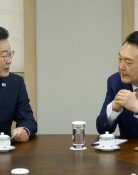Could N. Korean envoy to China be turning point for foreign policy?
Could N. Korean envoy to China be turning point for foreign policy?
Posted May. 23, 2013 07:29,
Choe Ryong Hae, the director of the General Political Bureau of the Korean Peoples Army, visited China as a special envoy of North Korean leader Kim Jong Un. Kims uncle Jang Song Thaek, the vice chairman of the Norths powerful National Defense Commission, visited China in August last year, but he was not a special envoy. Choe is the first special envoy sent by Kim Jong Un, who took power after his father, Kim Jong Il, died suddenly in December 2011. Considering that Choe is a key member of the Norths power elite, his trip to China is a reminder of the visit to the United States in October 2000 by Jo Myong Rok, the director of the North Korean militarys General Political Bureau, to discuss the proposed normalization of bilateral diplomatic relations. Attention is drawn to whether Choes visit to China could become a turning point that would change the security situation on the Korean Peninsula, where tensions run extremely high following Pyongyangs long-range missile launch and a nuclear test.
While both Pyongyang and Beijing remain silent about Choes trip, it is presumed that a key agenda would be to discuss North Koreas nuclear issue and ways to restore the strained bilateral ties. As the North unusually made the trip public, it is highly likely that Choe will meet with Chinese President Xi Jinping. Choes father has deep relations with the Communist Party of China (CPC) as a leading member of the Northeast Anti-Japanese United Army, a main guerrilla army organized by the CPCs branch in Manchuria.
It seems that Choes visit to China is part of Kim Jong Uns strategy to defend his regime, which has been on the defensive since a recent series of provocations. A recent summit between the South Korean and U.S. presidents sent a strong message urging the Norths denuclearization. The U.S.-China and the South Korea-China summits scheduled for next month will also likely oppose the Norths nuclear armament, putting Pyongyang in an urgent situation. Chinas implementation of United Nations sanctions on the North has become far more intense than in the past to the extent that major Chinese banks have suspended transactions with North Korea. At a time when Pyongyang desperately needs food and fertilizer assistance amid seasonal food shortages, Pyongyangs failure to appease the Chinese leadership could deal a serious blow to the Kim Jong Un regime, let alone the food shortages.
Sending the special envoy can also be seen as Pyongyangs attempt to offensively switch the situation. The North probably wants to overcome the current difficulties at any cost. It also seems that through the special envoys trip, Pyongyang wants to arrange Kim Jong Uns visit to China for direct negotiations with the Chinese leader.
The only way Pyongyang can defuse the current crisis is to stop its nuclear development and long-range missile launches and implement its promises with the international community. The starting point is to restore the stalled Kaesong Industrial Complex to normal operation. Seoul has proposed bilateral working-level talks to discuss ways to normalize the inter-Korean relations, including the Kaesong Industrial Complex issues. Pyongyang should ditch its outrageous claim of addressing fundamental issues first and return to the negotiation table. The international community, including the U.S. and China, are watching the Norths action. Kim Jong Un should hold the hands offered by the outside world to ensure the survival of his own regime and relieve the North Korean residents of their pain.







